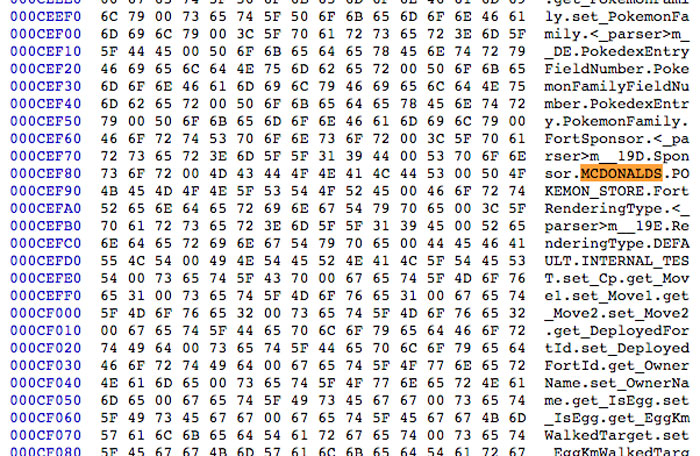Pokémon Go has obviously exploded in popularity in the past week, basically taking over the internet and the lives of everybody who downloads the app – and already it looks like the game's developer Niantic has plans to ramp up the massive commercial potential of the app.
Web sleuths peaking through the game's code have discovered what looks to be the first signs of sponsorship deals buried in the app, with a reference to global burger chain McDonald's being discovered by Australian student Manu Gill.
"In /assets/bin/data/managed/metadata, I found a file that looked like it was promising," Gill told Bryan Menegus at Gizmodo, after decompiling the Android version of Pokémon Go.
"So I opened it in a hex editor. The first chunk was garbage, but I eventually got to a bunch of strings. I just searched things until I got things that were promising, for instance, I searched sponsor and partnership and got to the McDonald's string set."
You can see the code below:
 Screenshot from Manu Gill's website.
Screenshot from Manu Gill's website.
Gill isn't the only one sifting through the game's code to find what's hidden there, with other users on Reddit claiming to have found evidence of potential sponsorship arrangements involving the game, such as a McDonald's logo located in the game's image assets.
"Based off what I've found it looks like they're going to hold a promo with McDonald's which'll turn them into all gyms," one of the Redditors, NeoProfessorWillow, told Gizmodo.
If these coders' speculation is correct, it's the first signs of what could turn out to be a major change in the way the game works – although, admittedly, a change that we had fair warning was coming.
While the free-to-play game makes money through optional in-app purchases in the form of PokéCoins, the game's developer, US-based Niantic – which is backed by both Nintendo and Google – has been upfront about how sponsorship deals would become part of the app. And specifically sponsored locations – which would entice players to visit real-world places as part of the game.
"There is a second component to our business model at Niantic, which is this concept of sponsored locations," Niantic's CEO John Hanke told the Financial Times, and the company's former game, Ingress – on which Pokémon Go's gameplay is largely based – used a similar monetisation ploy.
But while the idea – like augmented reality itself – isn't particularly new, in light of Pokémon Go's insane popularity, this way of attracting consumers to visit brands and businesses could become way more significant now.
"With these kind of ads, the physical location of the retail partner becomes an active location in the game so there are incentives for users in the game to visit those locations," Hanke explained to Emanuel Maiberg at Kill Screen back in 2014.
"It's in the early stages for that kind of a business model but I think it's a very promising one. Retailers want store traffic. They want consumers to be aware of where their locations are. They want consumers to be engaged with them, and I think these games are a powerful tool for that."
But will this strategy end up changing the experience of playing the game? Sounds like the world is about to find out.
